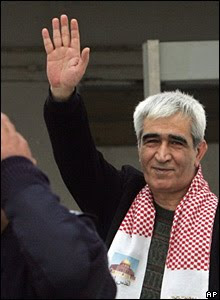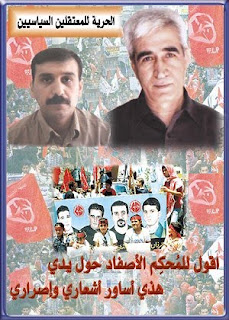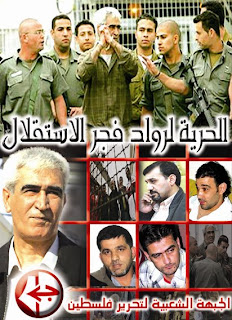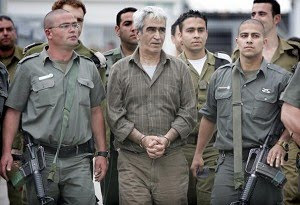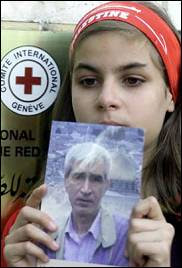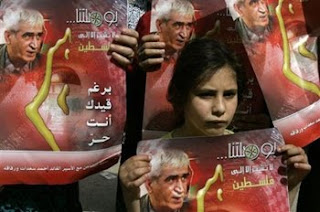Jailed for the ‘Crime’ of Resisting the Occupation
Ahmad Sa’adat is the imprisoned leader of the Popular Front for the Liberation of Palestine. He was sentenced to 30 years imprisonment in a military trial for the ‘crime’ of having led the resistance to the Israeli Occupation. Resistance is, of course, not a crime and Israel’s own leaders – Begin and Ben Gurion resisted the British Occupation and were also called terrorists in their time. Of course their resistance wasn’t anti-colonial but because the colonial power hadn’t allowed them to do what they wanted.
The PFLP is, one should remember, a secular organisation. Thus Israel and Zionism’s hypocrisy about ‘Islamic militancy’ is shown to be what it is, empty racist rhetoric. Because of course Israel has, from its inception, supported backward and reactionary Islamic elders against secular nationalists.
One of the ‘crimes’ that Sa’ada was accused of, though not in the court itself, was the assassination of the racist head of Moledet, General Rehavam Zevi, which the PFLP carried out in retaliation for the assassination of the previous PFLP General Secretary, Abu Ali Mustafa, in August 2001.
In fact the assassination of this monster was no crime at all. On the contrary it testifies to the humanity of the PFLP that it has foresworn the method of ‘suicide’ bombings or Israel’s aerial bombardment of buildings, which in one case killed 17 family members, in favour of a targeted and selective assassination.
Below are some articles from the web site dedicated to Ahmad Sa’adat’s campaign for freedom.
Tony Greenstein
Ahmad Sa’adat issues statement in support of Tunisian revolution
January 15, 2011
Ahmad Sa’adat, imprisoned Palestinian national leader, issued a message from his isolation cell on January 15, 2011, saluting the people of Tunisia and greeting their struggle and revolution. He congratulated all the political and social forces participating in the popular uprising against “a system of injustice, abuse and exploitation.” Sa’adat’s message stressed that the Tunisian popular revolution was the natural result of years of policies of marginalization and dictatorship, and the natural popular reaction to plunder and pillage of the Tunisian people’s resources at the hands of repressive, corrupt regimes that are agents of colonialism.
Sa’adat’s message said that the blood of the martyrs of Tunisia, popular involvement, the accumulation of experience of struggle, and the involvement of men and women, political parties and labor unions were the conditions that ensured the protection, survival and continuation of the uprising. He called for the protections of the achievements of the Tunisian people and the further development of community justice, democracy, and respect for the Tunisian people’s choices.
Sa’adat called upon all democratic political forces in Tunisia to come together to safeguard the achievements of the popular uprising of Tunisia and to achieve its just and legitimate demands.
Ahmad Sa’adat is the General Secretary of the Popular Front for the Liberation of Palestine and a member of the Palestinian Legislative Council. One of nearly 10,000 Palestinian political prisoners, he has been sentenced to thirty years in Israeli prisons for a range of “security-related” political offenses. These charges include membership in a prohibited organization (the PFLP, of which Sa’adat is General Secretary), holding a post in a prohibited organization, and incitement, for a speech Sa’adat made following the Israeli assassination of his predecessor, Abu Ali Mustafa, in August 2001.
Sa’adat is a prisoner of conscience, targeted for imprisonment because of his political activity and in his capacity as a Palestinian leader. The systematic assassination, imprisonment and detention of Palestinian political leaders has long been a policy of the Israeli state, as reflected in the imprisonment of Sa’adat and over 20 other members of the Palestinian Legislative Council, including Marwan Barghouthi, as well as the nearly 10,000 Palestinian political prisoners, targeted for their involvement in and commitment to the struggle for the liberation of their land and people.
Born in 1953, Sa’adat is the child of refugees expelled from their home in the village of Deir Tarif, near Ramleh, in 1948. A math teacher by training, he is married to Abla Sa’adat, herself a noted activist, and is the father of four children. Abla Sa’adat was herself arrested and detained for four months, and prevented from leaving Palestine to speak about Palestinian rights at an international conference. He has been involved in the Palestinian national movement since 1967, when he became active in the student movement. Prior to his abduction from Jericho in 2006, he had been held at various times as a political prisoner in Israeli jails, for a total of ten years. Sa’adat was elected General Secretary of the PFLP in 2001, following the Israeli assassination of then-General Secretary Abu Ali Mustafa in his office in Ramallah on August 27, 2001.
Sa’adat had been held in a Palestinian Authority prison for over four years, and, in January 2006, elected to the Palestinian Legislative Council on the Abu Ali Mustafa slate, when on March 14, 2006, the Israeli military stormed that prison at Jericho, abducting Sa’adat and five fellow prisoners and taking them to Israeli military prisons. For the entire period of Sa’adat’s imprisonment in the PA jails, he had been convicted of no crime; his sentencing- in an illegitimate military court of occupation – came nearly seven years into his detention, after a trial that began after five years of PA/US/British, then Israeli, imprisonment.
This trial was, of course, a military trial, as are the trials of nearly all Palestinian political prisoners, presided over by three military judges, two of which are not required to have any legal background. These trials are based on military law, including military regulations that may be issued at any time by the Israeli military commander over the area. This military rule under occupation dates from the era of the British occupation of Palestine, in which these “emergency” military rules were adopted in order to suppress the Palestinian national movement for independence and self-determination. These military laws continue today for the same purpose – to continue a military occupation and suppress the indigenous people of Palestine’s struggle for liberation and self-determination. Such military trials generally fail to uphold international standards for fair trials. At a more basic level, they are an illegitimate manifestation of an illegitimate system – trials that, by their very nature, can never be fair or legitimate.
Sa’adat is the child of 1948 refugees who, with six million others in Palestine, in the camps outside Palestine and in exile around the world, are denied their right to return to their homes, lands and properties and denied their right to organize, struggle and act to obtain their freedom, their return and their liberation.
JERICHO ASSAULT AND ABDUCTION
On March 14, 2006, the Israeli army laid siege for twelve hours to the Palestinian prison at Jericho holding six political prisoners. Israeli bulldozers and tanks attacked the prison while the Israeli military issued threats of assassination against the prisoners. This military assault caused the death of two Palestinians, the injury of twenty-three more, and the abduction of Ahmad Sa’adat and five other political prisoners from Jericho to Zionist prisons.
For over four years, these men had been held in the Palestinian Authority prison at Jericho, under U.S. and British guards. Immediately prior to the Israeli assault on the prison, these U.S. and British guards abandoned their posts, clearing the way for the military attack. The U.S. State Department blamed Palestinians for the siege, stating that the democratically-elected Palestinian Legislative Council leadership had indicated its willingness to release these illegally-held political prisoners. Said Sa’adat in a letter to the Palestinian people after his abduction, “The Quartet [US, EU, Russia and UN] provide a cover for occupation. What happened in Jericho Prison has made the British and US governments an integral part of the conflict and forever buried any illusions in their neutrality.”
Since his abduction – a blatant violation of Palestinian sovereignty – Sa’adat’s trial has been repeatedly postponed and delayed. Israeli Attorney General Menachem Mazuz admitted shortly following the abduction that there was insufficient evidence to indict Sa’adat in the assassination of extreme racist Israeli minister Rehavam Ze’evi in 2001, an act of retaliation for the August 2001 Israeli murder of PFLP General Secretary Abu Ali Mustafa. Instead, Sa’adat was indicted on a wide array of political charges in a hearing on March 28, 2006 at Ofer Military Base in Ramallah.
Sa’adat has consistently and repeatedly refused to recognize the legitimacy of the illegitimate court; his lawyers have petitioned for the charges to be dropped, as they are clearly politically motivated and the court itself is illegitmate. His trial was repeatedly postponed, from May 2006, to September 2006, to January 2007, to May 2007, and finally to July/August 2008. With each hearing, Sa’adat’s courageous refusal to recognize in any way the illegitimate court – refusing to stand for the military judges, issuing statements exposing this mockery of justice, and refusing to deal with the military courts or interrogators – stood in clear contrast to the system of occupation and oppression represented by the military courts, exposing its bankruptcy and illegitimacy.
On December 25, 2008, Sa’adat was sentenced to thirty years in the occupation prisons for these entirely political charges. His extensive sentence, produced by an Israeli military court, was intended as a mechanism for imprisoning the resistance and the commitment of the Palestinian people to seek freedom, justice, liberation and self-determination. This is the highest sentence delivered in the occupation courts for a political charge.
Maher Taher, member of the Political Bureau of the PFLP, speaking on behalf of the Front in an interview with Al-Jazeera, emphasized the complicity of the Palestinian Authority in Sa’adat’s abduction and imprisonment, as he had been held in PA jails for 4 years at the time, as well as the direct responsibility of the U.S. and Britain as strategic partners of the occupier, for this crime against Sa’adat and the Palestinian people.
Palestinian national political leaders from various trends strongly condemned the illegitimate court and its sentence, including the prime minister of the Gaza government, Ismail Haniyeh; the secretary-general of the Palestinian National Initiative, Mustafa Barghouthi; Ahmad Bahar, acting president of the Palestinian Legislative Council, Azzam al-Ahmad, chair of the Fateh legislative bloc; and Daoud Shihab, spokesperson for Islamic Jihad, all of whom labeled the military court and the sentencing as illegal and unjust.
ISOLATION
On March 18, 2009, Ahmad Sa’adat was suddenly transferred from Hadarim prison and to Asqelan prison, into solitary confinement. Sa’adat has been repeatedly subjected to solitary confinement and punitive measures at the behest of the Israeli regime. Sa’adat has been moved repeatedly from prison to prison, and often placed in solitary confinement or isolation.
In June 2009, Sa’adat engaged in a nine-day hunger strike against his isolation. On August 10, 2009, Sa’adat was moved from the isolation cells at Asqelan to the isolation unit at Ramon prison in the Naqab desert.
A severe set of sanctions has been directed at Sa’adat, including denial of family visits, denial of visits to the prison canteen, and a 200 shekel fine, as well as a week extension of solitary confinement. These punishments come in addition to an earlier set of draconian sanctions directed at Sa’adat as a result of his leadership in the prisoners’ movement, including denial of family messages, prohibition of cigarettes, and confiscation of all electrical appliances, newspapers and magazines.
On October 22, 2009, Sa’adat faced yet another hearing on his isolation at the Israeli military court at Bir Saba. Sa’adat once again registered his utter rejection of the Israeli military courts, and was joined by actions of solidarity and support throughout Palestine and around the world, organized by a wide array of prisoners’ rights organizations. At the hearing, Sa’adat’s isolation was extended by six additional months. His personal books have been confiscated and he is routinely denied access to television, newspapers or any other source of information. He continues to be denied family visits, including visits from his wife Abla. In the prison yard, Sa’adat has been held handcuffed and in ankle shackles and allowed only one-hour of exercise/recreation. All of this has been ‘justified’ by the occupation authorities as ‘punishment’ for giving two cigarettes to another prisoner.
Sa’adat met this news with a call for urgent and systematic action in Palestine and internationally to demand freedom for Palestinian prisoners, and particularly, to confront the “living death” of isolation and solitary confinement.
PA/BRITISH/US IMPRISONMENT
On August 27, 2001, PFLP General Secretary Abu Ali Mustafa was assassinated by a missile shot from an Apache helicopter by the Israeli military as he worked in his office in Ramallah. This assassination was the latest in a long line of assassinations by the Israeli state of Palestinian political leaders, a policy that continues to this day. Following the murder of Abu Ali Mustafa, Ahmad Sa’adat was elected General Secretary of the PFLP.
Rehavam Ze’evi, the tourism minister in Ariel Sharon’s Israeli government, represented the Moledet party, an extreme racist party whose program is based on the expulsion and ethnic cleansing of Palestinians from all of Palestine. Ze’evi, whose long military career included involvement in the war of 1948 and the expulsion of nearly a million Palestinian refugees from their homes and lands, continued his quest to uproot the Palestinian people through the Israeli military and political system throughout his career, referring to Palestinians as “a cancer” and “lice.” In retaliation for the murder of Abu Ali Mustafa, on October 17, 2001, fighters from the PFLP’s armed wing assassinated Ze’evi in the Hyatt hotel in Jerusalem.
Israel continued its campaign of mass terror against the Palestinian people, attacking Palestinian cities and towns, including the town of Beit Rima, where the Israeli military killed nine Palestinians while purportedly searching for Sa’adat. Israel repeatedly demanded that the Palestinian Authority crack down on the PFLP and arrest its leaders and members, threatening the PA leadership if it refused to act on behalf of the Israeli military to repress the Palestinian resistance. Nonetheless, yielding to the demands of Israel, the U.S. and Britain, on January 15, 2002, Sa’adat attended a meeting with PA security under false pretenses, from which he was abducted and taken to the Muqata’a compound in Ramallah, then-Palestinian President Yasser Arafat’s headquarters. In February 2002, four of Sa’adat’s comrades in the PFLP, Ahed Ghoulmi, Majdi Rimawi, Hamdi Qu’ran and Basel al-Asmar, were also arrested by PA security services and brought to the Muqata’a.
In March and April of 2002, Israeli military forces laid siege to the Muqata’a, and as demanded by the United States and Great Britain as a condition for the end of Israel’s siege of the Muqata’a, Sa’adat, Ghoulmi, Rimawi, Qu’ran, al-Asmar and Fuad Shoubaki would be transferred to the PA’s prison at Jericho to be held as political prisoners.
On April 25, 2002, Ghoulmi, Rimawi, Qu’ran and al-Asmar were tried in an impromptu military court of the Palestinian Authority inside the besieged Muqata’a. With Israeli tanks directly outside the Muqata’a, Quran, Al-Asmar, Rimawi and Gholmi were tried and sentenced for the Ze’evi assassination. Despite their civilian status, the four were tried before a military court presided over by Brigadier-General Ribhi Arafat, who had no legal standing to act as a judge. They were not allowed to have attorneys or proper legal defense in a trial that took a total of two hours. No evidence, no confessions and no statements were received in order to convict the four; all were found guilty and the verdicts immediately ratified by PA President Yasser Arafat, and the four were given no right to appeal the verdicts.
Ahmad Sa’adat was never charged nor tried for any crime. After the sentencing, the four were transferred on May 1, 2002, with the uncharged and untried Sa’adat, to Jericho Prison, ostensibly under the control of the PA, but subject to the guardianship of United States and British forces. On May 2, 2002, Israeli forces withdrew from the Muqata’a. The director of the US/British “supervision” of the prisoners at Jericho Prison formerly ran the infamous Maze Detention Center for Britain in the occupied North of Ireland. The prisoners were not subject to Palestinian sovereignty and authority, but rather to the conditions and demands of the United States and Great Britain. Sa’adat and his comrades were held under difficult conditions in Jericho prison, often secluded from one another and not allowed to communicate, denied access to newspapers, books, recreation and family and other visits. Water and electricity in their cells have been turned off, and numerous other punitive measures were implemented against them by the British and U.S. guards “monitoring” the prison. In response, Sa’adat and his comrades have engaged in two hunger strikes, demanding an end to inhumane treatment and their immediate release.
The Palestinian High Court of Justice, the highest Palestinian judicial body, ruled on June 3, 2002 that Sa’adat should be released immediately. Numerous Palestinian and international human rights organizations, including Amnesty International, called for the release of Sa’adat and the implementation of Palestinian and international law. Nevertheless, Sa’adat was never released; the PA refused to comply with the orders of its own judiciary, the U.S., Britain, and Israel demanded he remain held as a political prisoner, and the PA complied with their demands. While Sa’adat was imprisoned in Jericho, on August 20, 2002, the Israeli military assasinated his brother Mohammed, illustrating the continuing campaign of assassination and murder on the part of the Israeli regime. Sa’adat – and his fellow political prisoners – remained in Jericho prison in 2006, until the Israeli siege on the prison.
PALESTINIAN POLITICAL PRISONERS
There are, today, nearly 10,000 Palestinian political prisoners held in Israeli jails. Palestinians, living under occupation and oppression for nearly sixty years, have been targeted relentlessly for imprisonment and detention for that time. Since the extension of the occupation of Palestine to the West Bank and Gaza Strip in 1967, over 650,000 Palestinians have been taken prisoner – one out of every four Palestinians from the West Bank and Gaza. Forty percent of male Palestinians in the West Bank and Gaza have spent time in jail as a political prisoner, or held under administrative detention – arbitrary detention without charge. The effects of political imprisonment on Palestinian society have, thus, been massive and vast.
Palestinian political prisoners are often activists working to end the occupation of their land and the oppression of their people. In 1948, 78% of historic Palestine was conquered by Zionist armies – armies composed of Europeans who sought to establish an ethnically and religiously exclusive state on the land of Palestinian Arabs. Nearly one million Palestinians were made refugees, who have continued to struggle to attain their right to return to their homes and lands ever since. In 1967, the remaining 22% of Palestine – the West Bank and the Gaza Strip – were invaded and seized by Zionist armies, now identified as the army of the state of Israel. Many Palestinians have been working to end this brutal military occupation, obtain the return of the refugees, and liberate the land of Palestine. For that activity, they have been targeted by the occupying forces for detention and imprisonment.
Palestinian political prisoners represent every major Palestinian political organization. Dozens of members of the elected Palestinian Legislative Council are currently imprisoned. These prisoners are not held because they are charged with traditional crimes, disturbing their communities or hurting their families. They are held because they, as Palestinians, organized, acted, or fought for the freedom of their land.
Palestinians’ arrest and detention are covered by Israeli military regulations; there are over 1500 of these regulations at any given time, which can be altered at any time by the Israeli military commander of the region creating new regulations to which Palestinians must adhere -or be subject to arrest, detention and imprisonment. Prisoners are transferred to Israeli facilities for holding, detention and sentencing. Although it is a violation of the Fourth Geneva Convention for these prisoners to be transported outside the parts of Palestine occupied in 1967 -the West Bank and Gaza – they are often transferred to the parts of Palestine occupied in 1948 – Israel – as 21 of 24 Israeli detention facilities are within those 1948 lines. Palestinian attorneys and family members from the West Bank and Gaza attempting to visit their clients and loved ones in prison are often turned back from the border and prohibited entry.
Because these prisoners are often extensively involved in activism and organizing, despite the horrid conditions of detention, Palestinian political prisoners have become a highly organized group, operating prisoners’ associations, political organizations within the prisons and representative committees, and engaging in protests and hunger strikes that have drawn the attention of the world to their cause. Their voice within the Palestinian national movement is honored for its clarity, and for the sacrifices these prisoners have made for the freedom of their people and the liberation of their land.
Palestinian prisoners are often arrested in mass arrest campaigns; the Israeli military admits to arresting approximately 700 Palestinians on a monthly basis. Entire male populations of villages or neighborhoods may be rounded up and arrested. The use of “moderate physical pressure” in Israeli interrogations is accepted, legal and common. Legalized torture in Israeli jails includes the use of shortshackling, “stress positions” – painful positions in which a prisoner is shackled for periods of time, beatings and squeezing of handcuffs, as well as sleep deprivation, exposure to temperature extremes for extended periods of time, humiliation and threats, and many other documented tactics of abuse. In June 2003, the Palestinian Prisoners’ Society estimated that 90% of Palestinian detainees were tortured while in Israeli custody, and confessions and information extracted through torture are admissible in Israeli military courts.
There are, at present, over 100 Palestinian women prisoners held in Israeli jails. Over half of the Palestinian women detainees have never been tried, and twelve of them are minors. Female prisoners who give birth find their babies imprisoned with them until the child turns two, when he or she is released to family on the outside, and pregnant female prisoners are handcuffed to their beds during labor and birth. Thousands of Palestinian children have been detained by Israel. At the age of 12, Palestinians may appear before military courts, and at the age of 16, may be tried fully as adults. There are no juvenile prisons, and Palestinian children often serve their sentences in the same cells as adults. Over 6000 Palestinian children have been detained since 2000, and there are 398 imprisoned Palestinians under 18 at the present time.
The imprisonment of Palestinian political prisoners – some of the strongest organizers, activists and leaders of Palestinian society – is a deeply felt wound in the Palestinian community. The freedom of these prisoners, imprisoned because of their desire to see their homeland free, is a necessary part of achieving justice for the Palestinian people.
Below is an interview with Ahmed Sa’adat from when he was imprisoned by Arafat’s Palestinian Authority in Jericho Prison. It is also a reminder that Arafat and his regime, although it didn’t plumb the depths that Abbas has done, also collaborated with Israel.
Leftist PFLP leader live from PA prison in Jericho
Ma’an Jericho Prison – General Secretary of the Popular Front for the Liberation of Palestine, Ahmed Sa’adat, spoke live Tuesday afternoon from Jericho’s Palestinian Authority prison.
From the eastern West Bank city, the leftist PFLP leader said, “In 20 days we will be at the date to choose your PLC [Palestinian Legislative Council] members as a part of a complete operation to build the political leadership base for Palestinians and for the PLO [Palestinian Liberation Organization].”
He continued, “You must remember that your vote is your right and to do so is to remain faithful to the those killed, to the prisoners and to the needy. And it is for the workers, and the for people who lost their lands to Israel to build the Wall and the settlements that are confiscating our lands.”
“On 25 January we are at the point to change our lives toward independence and freedom and toward domination.”
He asked, “Will we form a democratic system to develop our rights to our full potential, for our education, health and social systems?”
“Or,” Sa’adat asked, “Will we return with the same system, and worst, with all the negative phenomena? Will we return to the lawlessness, political insecurity and lack of basic security, and with the absence of the rule of law?”
Sa’adat called on all Palestinians to participate in the PLC elections. He called on them to do their “jobs and participate.”
“The PFLP, from a place of commitment to social and national rights, decided to participate in the PLC elections, and formed the list called ‘Abu Ali Mustafa,’ out of respect to his revolutionary education, and out of respect to prisoners and to all Palestinians.”
He explained that the Abu Ali Mustafa list is comprised of people who resist and who represent all aspects of Palestinian society and life.
The PFLP leader said, “We are participating in the elections under the name of a democratic and national program, which is an alternative program to that which has kept Palestinians in a difficult situation for the past several years. The new system will gather resistance and will create national stability in return. It will build a free nation with Jerusalem as its capital.”
Sa’adat continued, “The new program will require international society to plan for a political project, built on achieving what exists in international law, a program that is an alternative to the negotiations based on Oslo, and will contain the older version of the new project, the Road Map.”
He said, “The program is aimed to return the respect for the PLO and their role as a means to unify our society and to rebuild it based on democratic and national principles, to open the doors and to represent all Palestinian social and political perspectives.”
Sa’adat continued, “It will develop the strength of the national resistance with Arab steadfastness in facing the plans of the enemies that have aimed to dominate Arab lands, and to confiscate their lives. The program will open chances for all political and social forces to participate in making decisions, and in leading society.”
At the end of his speech, Ahmed Sa’adat declared, “In the name of prisoners, Palestinians outside of Palestine, Palestinians in lands inside ’48, and in the name of the resistance; In the name of the pencil, the word and the rock in Palestine, Iraq and Lebanon, and in every nation that faces suffering, we begin our electoral campaign for the PLC elections.”
